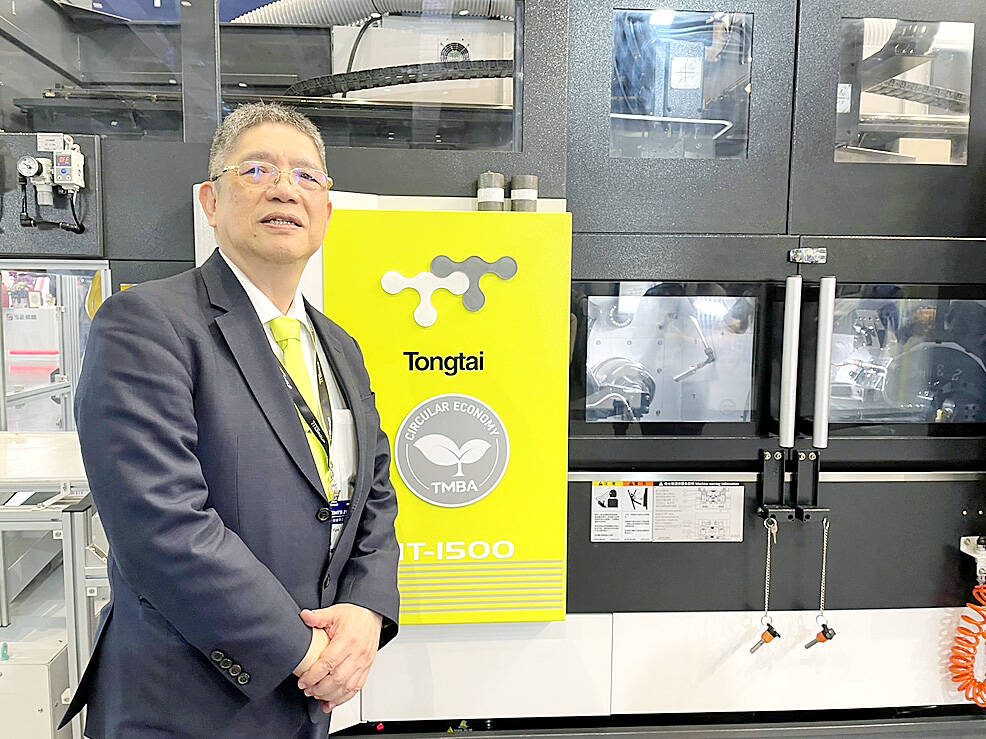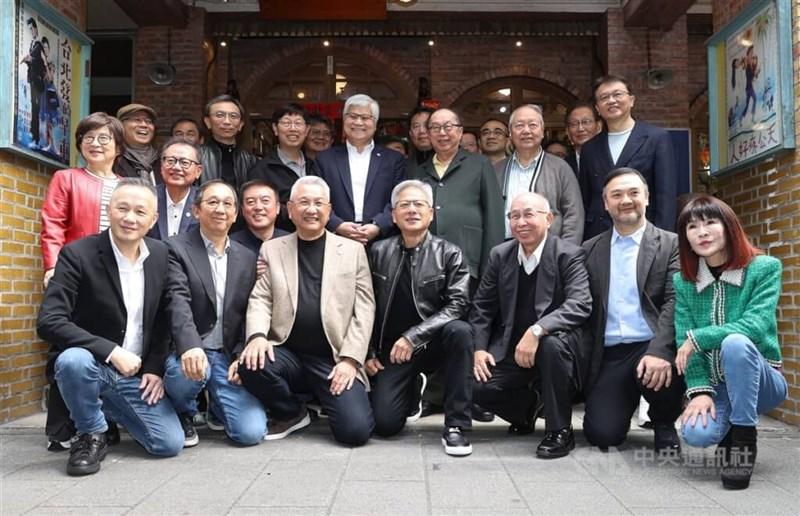Taiwanese manufacturers have a chance to play a key role in the humanoid robot supply chain, Tongtai Machine and Tool Co (東台精機) chairman Yen Jui-hsiung (嚴瑞雄) said yesterday.
That is because Taiwanese companies are capable of making key parts needed for humanoid robots to move, such as harmonic drives and planetary gearboxes, Yen said.
This ability to produce these key elements could help Taiwanese manufacturers “become part of the US supply chain,” he added.

Photo: CNA
Yen made the remarks a day after Nvidia Corp cofounder and chief executive officer Jensen Huang (黃仁勳) said his company and Taiwan Semiconductor Manufacturing Co (TSMC, 台積電) are jointly creating new opportunities in areas such as robotics and self-driving cars.
However, the biggest obstacle to making humanoid robots more widely available is the high cost, said the head of Tongtai Machine, a major machine tool manufacturer based in Kaohsiung.
The current unit cost of humanoid robots is so high that it effectively adds “an extra zero” to the target price, Yen said.

Photo: CNA
However, “reducing the cost of humanoid robots presents an opportunity for Taiwanese key component manufacturers to play a crucial role,” he added.
Huang concluded his three-day “pop-up” visit to Taiwan yesterday. One day earlier, he hosted a luncheon to treat the high-ranking management of his company’s supply chain partners in Taiwan, including TSMC chairman C.C. Wei (魏哲家), Hon Hai Precision Industry Co (鴻海) chairman Young Liu (劉揚偉) and Quanta Computer Inc (廣達) chairman Barry Lam (林百里).
Other big names included Asustek Computer Inc (華碩) chairman Johnny Shih (施崇棠), Pegatron Corp (和碩) chairman Tung Tzu-hsien (童子賢), Siliconware Precision Industries Co (矽品) chairman Tsai Chi-wen (蔡其文), Acer Inc (宏碁) chairman Jason Chen (陳俊聖), Wistron Corp (緯創) chairman Simon Lin (林憲銘) and Inventec Corp (英業達) chairman Sam Yeh (葉力誠).
Huang is upbeat about the prospects of robotics development. He previously revealed that the US-based artificial intelligence (AI) chip designer is actively investing in three major robotics hardware and software solutions: Agent AI, humanoid robots and autonomous vehicles.
In his keynote speech at the Consumer Electronics Show (CES) in Las Vegas earlier this month, Huang showed off the next-generation Thor Blackwell Robotics Processor, which can be used in automated handling machines and humanoid robots.
Tesla Inc cofounder and CEO Elon Musk announced during the CES that the electric car maker plans to produce 50,000 to 100,000 Optimus humanoid robots by next year, with a goal of expanding production to at least an annual output of 500,000 units by 2027.

On Ireland’s blustery western seaboard, researchers are gleefully flying giant kites — not for fun, but in the hope of generating renewable electricity and sparking a “revolution” in wind energy. “We use a kite to capture the wind and a generator at the bottom of it that captures the power,” said Padraic Doherty of Kitepower, the Dutch firm behind the venture. At its test site in operation since September 2023 near the small town of Bangor Erris, the team transports the vast 60-square-meter kite from a hangar across the lunar-like bogland to a generator. The kite is then attached by a

Foxconn Technology Co (鴻準精密), a metal casing supplier owned by Hon Hai Precision Industry Co (鴻海精密), yesterday announced plans to invest US$1 billion in the US over the next decade as part of its business transformation strategy. The Apple Inc supplier said in a statement that its board approved the investment on Thursday, as part of a transformation strategy focused on precision mold development, smart manufacturing, robotics and advanced automation. The strategy would have a strong emphasis on artificial intelligence (AI), the company added. The company said it aims to build a flexible, intelligent production ecosystem to boost competitiveness and sustainability. Foxconn

Leading Taiwanese bicycle brands Giant Manufacturing Co (巨大機械) and Merida Industry Co (美利達工業) on Sunday said that they have adopted measures to mitigate the impact of the tariff policies of US President Donald Trump’s administration. The US announced at the beginning of this month that it would impose a 20 percent tariff on imported goods made in Taiwan, effective on Thursday last week. The tariff would be added to other pre-existing most-favored-nation duties and industry-specific trade remedy levy, which would bring the overall tariff on Taiwan-made bicycles to between 25.5 percent and 31 percent. However, Giant did not seem too perturbed by the

TARIFF CONCERNS: Semiconductor suppliers are tempering expectations for the traditionally strong third quarter, citing US tariff uncertainty and a stronger NT dollar Several Taiwanese semiconductor suppliers are taking a cautious view of the third quarter — typically a peak season for the industry — citing uncertainty over US tariffs and the stronger New Taiwan dollar. Smartphone chip designer MediaTek Inc (聯發科技) said that customers accelerated orders in the first half of the year to avoid potential tariffs threatened by US President Donald Trump’s administration. As a result, it anticipates weaker-than-usual peak-season demand in the third quarter. The US tariff plan, announced on April 2, initially proposed a 32 percent duty on Taiwanese goods. Its implementation was postponed by 90 days to July 9, then